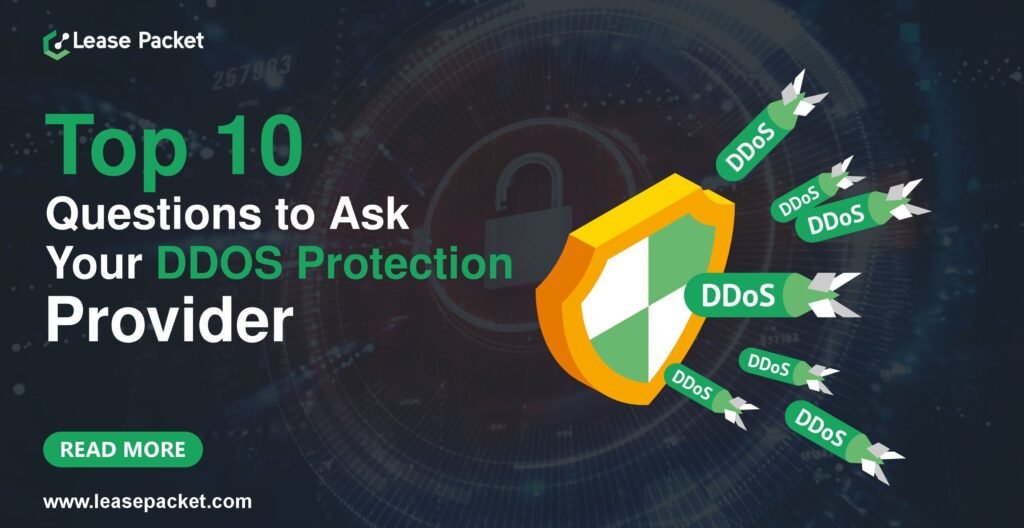DDoS protection is the act of defending a specific server or network from a distributed denial-of-service (DDoS) attack. Using specific network equipment or a cloud-based protection service allows a targeted victim to reduce the impact of the incoming threat.
These providers of DDoS mitigation services possess the necessary resources, expertise, and background to detect and prevent such attacks. Unfortunately, not all DDoS mitigation service providers are of the same quality, so it is important to thoroughly research before selecting the right one. This article will outline ten important questions to consider before selecting a DDoS mitigation provider.
Top 10 Questions to Ask Your DDoS Protection Provider
1. What is your deployment model?
Every DDoS protection provider has a different model, make sure the model is aligned with yours. The most common deployment model that DDoS mitigation service providers use is:
- On-premise
- On cloud
- Hybrid
An on-premise deployment model includes a device that analyzes traffic before it reaches your network. This setup is particularly effective for defending against slow and low-level attacks. On the flip side, cloud-based deployment models use scrubbing centres, which monitor the traffic before it reaches your network.
2. How much control and visibility do you have over the network?
Employ the services of a DDoS mitigation provider that has ownership of the core of its network, along with multiple points for analysis. The DDoS protection service you are considering should have a large network of scrubbing centres. This allows them to detect and eliminate the negative impact of DDoS attacks. Blocking all malicious traffic is possible, even when it originates from multiple sources simultaneously.
3. Is the service cloud-native
If a DDoS mitigation service is cloud-native, it will be more effective. It must be cloud-native, not on-premise technology that has been virtualized and hosted in cloud data centres.
Cloud-native mitigation services may scale with your organization without causing performance bottlenecks. However, cloud-hosted virtual appliances still require on-premise hardware maintenance.
4. How quickly can the service detect and react to DDoS attacks?
A low time-to-mitigate (the amount of time it takes to identify and stop an attack) is essential when one is being faced with one. Anything more than a few seconds of downtime can have irreversible consequences for the customer experience, brand reputation, and revenue.
5. Is the service available in every data centre?
If DDoS scrubbing functions are not available at all data centers, your traffic will be redirected through specialized “scrubbing centers” which can cause delays and affect the performance of your applications. Select a provider that can provide mitigation services across all data centers, while ensuring that your traffic remains on the most efficient route.
6. Is the service automated?
A strong DDoS protection service should provide automation and the ability to self-service through a dashboard or platform API, allowing you to easily activate and control your defence against danger Find a supplier that is easy to work with. available, responsive, and alert in identifying risks and addressing them without causing any interruptions
7. What Types of Cybersecurity Attacks Can You Defend Against?
There are numerous varieties of DDoS attacks. Each one focuses on a separate level within your technology infrastructure. Each category has its own specific methods for transportation and reduction. This is where your potential DDoS protection service provider can be useful.
The majority of DDoS protection services can stop DDoS attacks by blocking attackers who try to overwhelm your network with fake traffic. The key factor that sets exceptional DDoS mitigation service providers apart from others is their capacity to effectively manage attacks across various layers of the technology infrastructure. Select a DDoS mitigation service supplier that can stop assaults at higher tiers involving numerous protocols, including SSL, TCP, UDP, and HTTPS tunnels.
8. What is your network capacity?
You should ask the service provider how much network capacity they have and what size of DDoS attacks they will be able to handle.
The higher the network throughput, the more capable the DDoS mitigation service is. You should also ask about the speed at which packets are analyzed and forwarded by the scrubbing centers. The faster this process, the more effective the DDoS protection.
9. Does the protection provider have an SLA?
A Service Level Agreement, or SLA, is a universal tool for assessing the level of service. It is beneficial for both customers and providers and helps build transparent terms of cooperation.
The SLA consists of:
- Qualitative standards for service delivery;
- The time frame for mitigating the consequences of cyberattacks;
- The amount of fines that the provider will have to pay if the quality of the provided services is below the established level;
- Technical support response time; terms of resolving complex cases;
- terms of payment.
10. How quickly do you respond?
A determined denial-of-service attack can not only render your website unavailable but also disrupt your business operations. The longer a DDoS attack persists and renders your website inaccessible, the greater the financial losses will be in terms of sales and revenue.
Conclusion
DDoS attackers are aggressive and intelligent; they will identify and attack weaknesses. Companies that have DDoS protection through their ISP, CDN, or hosting may assume they have a strong defence against these bullies, but attackers consistently prevail when they hit edge routers, applications (including the use of SSL), and upstream ISPs, which are the most difficult areas to secure.
An informed strategy is to leverage what ISPs and CDNs excel at – allowing dependable connectivity with end users and expediting web content delivery – and combine that skill with routed DDoS protection from a pre-play vendor with extensive experience.
Choose Lease Packet for unbeatable DDoS protection, ensuring robust security and uninterrupted service for your business.







More Stories
Transforming Retail Experiences with AI in Retail: Personalization, Automation, and Smarter Inventory Management
The Art of Web Designing in Dubai UAE
7 Programming Languages for WordPress Sites